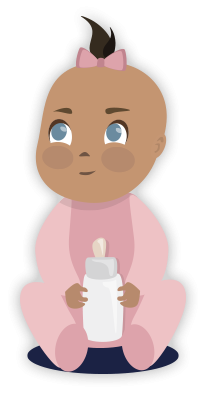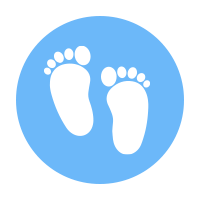6-8 Months:
The CDC has not identified milestones for this age and area of development. As a parent, you know your child best. If you think there could be a problem with the way your child plays, learns, speaks, acts, and moves talk to your child’s doctor and share your concerns.
- Most babies by 7 months sleep about 12-16 hours in a 24 hour period, including about 2 to 3 naps during the day.
9-12 Months:
The CDC has not identified milestones for this age and area of development. As a parent, you know your child best. If you think there could be a problem with the way your child plays, learns, speaks, acts, and moves talk to your child’s doctor and share your concerns.
- At 9-12 months babies usually sleep longer stretches during the night.
- Most babies at this age typically sleep 10 to 12 hours at night and take about 2 naps during the day.
- “Read” to your baby every day by looking at colorful pictures in magazines or books and talk about them. For example, while looking at books or magazines, name the pictures as you point to them.
- Respond to her when she babbles and “reads” too. For example, if she makes sounds, say “Yes, that’s the doggy!”
- Sing to your baby and play music. This will help his brain develop.
- Learn to read your baby’s moods. If he’s happy, keep doing what you are doing. If he’s upset, take a break and comfort your baby.
- Limit screen time (TV, tablets, phones, etc.) to video calling with loved ones. Screen time is not recommended for children younger than 2 years of age. Babies learn by talking, playing, and interacting with others.
- Help your baby learn she can calm down. Talk softly, hold, rock, or sing to her, or let her suck on her fingers or a pacifier. You may offer a favorite toy or stuffed animal while you hold or rock her.
- To help your baby wind down and fall asleep more easily, you may want to create a short, relaxing bedtime routine. This could include giving them a warm bath, singing them a soothing lullaby, and breast- or bottle-feeding them.
- Sing to your baby and play music. This will help his brain develop
- Point out new things to your baby and name them. For example, when on a walk, point out cars, trees, and animals.
- Place toys on the ground or on a play mat a little out of reach and encourage your baby to crawl, scoot, or roll to get them. Celebrate when she reaches them.
- Give your baby time to get to know a new caregiver. Bring a favorite toy, stuffed animal, or blanket to help comfort your baby.
- Is there anything your baby does or does not do that concerns you?
- Has your baby lost any skills he/she once had?
- Does your baby have any special healthcare needs or was he/she born prematurely?
If your baby is not meeting one or more milestones, has lost skills he or she once had, or you have other concerns, act early. Talk with your baby’s doctor, share your concerns, and ask about a developmental screening.
If you or the doctor are still concerned:
- Ask for a referral to a specialist who can evaluate your baby more.
- If the evaluation still shows concerns call your state Early Intervention program to find out if your baby can get services to help. Learn more and find the number at Missouri First Steps Program.
What's Next?
Download the Milestone Tracker app today!
Track your child’s milestones from age 2 months to 5 years with the CDC’s easy-to-use illustrated checklists; get tips from the CDC for encouraging your child’s development; and find out what to do if you are ever concerned about how your child is developing. Photos and videos in this app illustrate each milestone and make tracking them for your child easy and fun.













